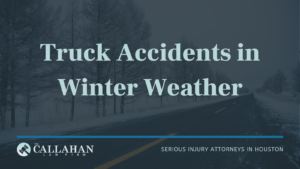Truck Accidents in Winter Weather

A loaded 18-wheeler can weigh up to 80,000 pounds, making them a major hazard for everyday drivers. The size, mass, and weight of these vehicles means that 18-wheeler accidents can be particularly dangerous for drivers in smaller passenger vehicles. Everyday drivers are even more at-risk in the winter months, when inclement weather can make roads slippery and reduce visibility. Winter-weather truck accidents can lead to serious injuries or even fatalities for those involved, as well as causing significant damage to property and disruptions to daily traffic.
Truck Accidents in Winter
One of the primary reasons why 18-wheeler accidents are more common in winter weather is due to the difficulties that these large vehicles face when driving on slippery roads. 18-wheelers have a much higher center of gravity than passenger vehicles, which means that they are more prone to tipping over when making sharp turns or encountering slippery conditions.
This can be especially dangerous when driving on roads that are covered in snow or ice, as these inclement weather conditions can reduce traction on the roads’ surface and make it more difficult for a truck driver to maintain control of their vehicle. Adverse weather conditions such as ice, snow, rain, and hail can make roads more hazardous for truck drivers and drivers of passenger vehicles alike.
Additionally, winter weather conditions can also reduce visibility for truck drivers on the roads. Snow, sleet, and freezing rain can all create visibility issues for drivers, making it more difficult for them to see other vehicles or potential hazards on the road. Additionally, reduced daylight hours means that drivers are often running their routes in the dark. This can lead to accidents, as the driver may not be able to react in time to avoid a collision.
Texas Weather-Related Accident Statistics
Reports from the Texas Department of Insurance state that a crash occurs on Texas roads roughly every 56 seconds, totaling more than 633,599 motor vehicle collisions statewide each year. An estimated 10% of those crashes occur during adverse weather conditions.
Last year, 56,637 motor vehicle collisions occurred during inclement weather conditions across the state of Texas. 47,567 of those crashes occurred in rainy weather, while 3,408 happened in snowy weather. There were 3,322 car accidents that occurred during foggy weather, while 2,340 occurred when the roads were experiencing sleet and/or hail.
How Truck Drivers Can Prevent Accidents in Winter Weather
There are several steps that can be taken to reduce the risks of 18-wheeler accidents during the winter months. One of the most important is for drivers to take extra care when driving in these conditions. Inexperienced drivers or drivers used to working in warmer climates may not know how best to handle driving in adverse weather conditions. Trucking companies should work to ensure they train their truck drivers on how to safely operate these vehicles in adverse weather conditions. This may include providing training on how to maintain control of the vehicle on slippery roads, as well as teaching drivers about the importance of reducing speeds and increasing following distances in inclement weather.
Additionally, it is important that trucking and shipping companies ensure that their vehicles are outfitted with the necessary equipment and loaded in a way that makes them equipped to handle long hours of travel in a variety of climates. Depending on the length and distance of a haul, truck drivers may experience a variety of weather conditions over the course of a single trip, meaning that they must be equipped with the skills to handle their vehicle in such conditions.
Truck drivers and the companies that employ them to make sure that their vehicles are equipped with the proper equipment, such as chains or traction devices for the tires, necessary for winter driving. They should also be sure to inspect the truck and ensure that all the lights and signals on the vehicle are in good working order before allowing a truck driver to hit the road.
Finally, governments and transportation agencies can also play a role in reducing the risks of 18-wheeler accidents during the winter months. This may involve investing in infrastructure improvements, such as adding additional lanes or improving road surfaces to make them more resistant to slippery conditions. It may also involve implementing stricter regulations for commercial vehicles, such as requiring drivers to have additional training or mandating the use of certain safety equipment.
—
If you or a loved one has been injured in a truck accident, contact our Texas Truck Accident Lawyers. We have been successfully representing injured people and their families for over 25 years, and we can help you too. Give us a call at 713-224-9000, or fill out our contact form here.

Michael S Callahan is an attorney and founder of The Callahan Law Firm. He focuses his practice on representing individuals and families in personal injury cases involving motor vehicle and truck accidents, workplace accidents and defective products. With over 25 years of experience, he is dedicated to fighting on behalf of people whose lives have been forever altered by the negligence and carelessness of corporations and individuals. Originally trained as a mechanical engineer, Michael has been practicing law and fighting for justice for those who need it most since 1994. He is board-certified in Personal Injury Trial Law by the Texas Board of Legal Specialization and a member of various esteemed legal associations. Outside of work, Michael enjoys spending quality time with his family, outdoor activities, and continually striving to improve as a trial lawyer and human being.











